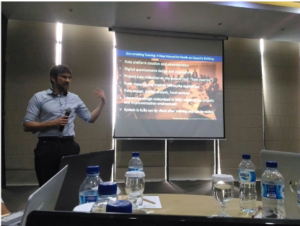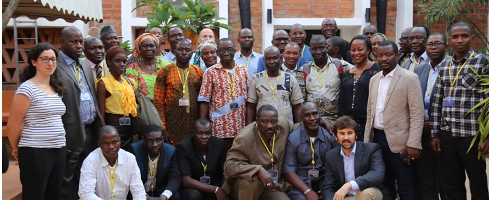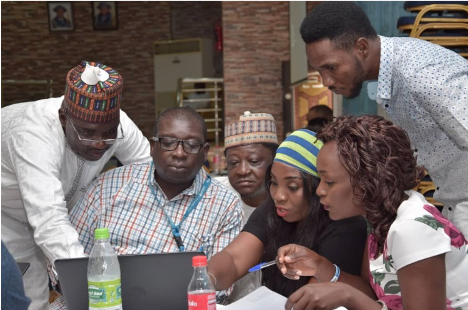This is the sixth article in a series of blog posts that describe how Cisco enables nonprofits to maximize technology for greater scale and impact. Our introduction to the series is available here. To read more articles in the series click here.
According to The United Nations Office for the Coordination of Humanitarian Affairs, nearly 168 million people (1 in 45) around the world will need humanitarian assistance and protection in 2020. Humanitarian organizations and relief agencies are among the first on the scene to help people in need during natural disasters and in war-torn regions. Effective humanitarian work requires good data in order to understand what the needs are on the ground. For example, in a hurricane, aid workers need to know which supplies are in short supply. Data collection used to occur manually given the lack of internet access in crisis regions. This process not only caused delays and errors, but it made it challenging to coordinate a fast response.
Since 2014, Cisco has partnered with KoBoToolbox, a free, open-source digital data collection and analysis tool for the NGO sector. This tool makes it possible for disaster-relief workers to create surveys and collect data in any language. KoBoToolbox users are also able to inspect data right after it is received, even in areas that lack internet access. Using KoBoToolbox leads to faster response time and more efficient resource distribution. The tool also makes it easier to share information so aid workers can better coordinate relief efforts. Now the platform has over 200,000 users in all 195 countries around the world, with an estimated 23 million individuals benefiting from the digital data collection tool. KoBoToolbox receives 5 million survey submissions every month and has been used to collect data after every significant humanitarian crisis since 2014.
Erin Connor, critical human needs portfolio manager for Cisco Corporate Affairs and the Cisco Foundation, shared why we chose to support KoBoToolbox,
“Cisco Foundation supports early-stage, technology-driven initiatives that have the potential to scale and replicate. With KoBoToolbox, we saw a technology solution that addressed an operational need felt by many others in the humanitarian and disaster response space: to quickly assess needs on the ground in times of crisis that can inform relief activities and facilitate greater coordination among those responding.”
Before Cisco’s involvement, KoBoToolbox was available only to a small group of humanitarians. Cisco funded KoBoToolbox to support the development and public launch of KoBo v1.0. Our support helped to build their user base, generate custom reports for users, and develop a research question library. The free and open-source software platform is now used to conduct humanitarian needs assessments by organizations such as the United Nations, Doctors Without Borders, the World Bank and Save the Children. These assessments also help these agencies and NGOs get a better idea of how to improve their programs and services. Phuong Pham, the founder of KoBoToolbox, envisioned KoBoToolbox as a solution to challenges she experienced as a field epidemiologist assessing the impact of conflicts and other forms of violence. “Equally important are the tens of thousands of local and community-based organizations which use KoBoToolbox for a wide range of purposes,” Phoung explains. Patrick Vinck, co-founder of KoBoToolbox notes that, “these local organizations are often the first responders during emergencies and they stay long after international responders are gone. The support of Cisco is essential to ensure that we can sustain KoBoToolbox as a global public good that benefits these frontline responders and the wider humanitarian and development communities.”
KoBoToolBox and The World Bank: finding better ways to monitor humanitarian action and development projects
Bernhard Metz, a Senior Operations Officer at the World Bank, is the lead for the Geo-Enabling initiative for Monitoring and Supervision (GEMS) managed by the Fragility, Conflict, and Violence group. GEMS was born from a desire to find better ways to monitor development projects and humanitarian response in areas that face limited access and logistical constraints. With KoBoToolbox, they found a tool that simplifies field data collection and centralizes all information it in one integrated and easy-to-use system. Bernhard shared,

“Without KoBoToolbox, GEMS would barely exist. We tried many of the tools out there and quickly decided to use KoBoToolbox for a couple of reasons. First, it is open source, and entirely cost-free. Second, KoBoToolbox is very easy to use for anyone, without the need for IT, GIS, or coding skills. Third, KoBoToolbox is widely used by the humanitarian and development community, which vastly facilitates coordination and cooperation. GEMS have trained over 2,000 government and NGO staff in 34 countries on how to use KoBoToolbox. Some had experience with digital data collection, but most didn’t. Amazingly, at the end of each training, users are able to create and present their own digital monitoring systems that are customized to their needs and start collecting better data right away.”
GEMS has been using KoBoToolbox in a very systematic way for tracking, monitoring, and evaluation so they can close information gaps in fragile states. In nearly two years since GEMS began, they have been using KoBoToolbox for 450 development and humanitarian projects around the world including a nutrition project in Uganda that uses KoBoToolbox to monitor deworming activities that are crucial to the health of school children; a project in South Sudan where KoBoToolbox is used to map remote health facilities and track available services and medicine; and in Niger, KoBoToolbox helps to plan and supervise infrastructure investments for refugees. After respective GEMS trainings, KoBoToolbox was just selected as the official data collection and coordination tool for the Recovery and Peacebuilding Process in the Central African Republic, facilitating the cooperation between the government, the United Nations, the EU and various bilateral donors.
“The GEMS training program helps local institutions in developing countries set up their own data analysis systems through KoBoToolbox,” said Bernhard. When it comes to using technology at scale, KoBoToolbox has been fundamental for scaling through GEMS’ “train-the-trainers” approach for field data collection.

GEMS had a KoBoToolbox training in the Democratic Republic of Congo (DRC). Among the 60 participants, two people from an education project attended. A couple of months later, the GEMS team got an email from them that said KoBoToolbox had changed everything. For the first time ever, detailed data on over 25,000 schools were collected within three months, changing the perspective of the Ministry of Education. The real-time data revealed crucial service delivery gaps in remote areas and inadequate conditions of schools throughout the country, which allowed the government to intervene and enhance education services. The two initial people that Bernhard and his team had trained went back to the ministry, taught 40 people, and those 40 people trained 800 people. “I love my job because of these human elements. We are training real people in some of the most complex environments, and every time we learn more from them than we teach them,” said Bernhard.
Bernhard also has personal experience as a long-time user of KoBoToolbox on a mission in Northeast Nigeria. This region is among the most dangerous in the world because of the presence of the terrorist organization Boko Haram, known internationally for kidnapping nearly 300 girls from a secondary school in 2014. The Boko Haram insurgency has displaced nearly 2.4 million people in that area, creating a massive humanitarian crisis. Yet due to the ongoing conflict, it is a very dangerous place for humanitarian workers to operate. Bernhard explains how KoBoToolbox helped them work around these challenges,
“KoBoToolbox helps us overcome access constraints because it allows us to put eyes on the ground where you cannot always have feet on the ground. You can get reliable real-time information and access structured data from conflict hotspots. For having a real impact and not doing harm, we need to see what is happening on the ground. KoBoToolbox helps us get these insights in a very structured way; we see the exact location where data was collected and we see what the locals see, when they take a photo with KoBoToolbox. It is a game-changer for the World Bank and its partners because we can supervise projects in those areas without physically being there.”
During his time in Nigeria, Bernhard visited a water project implemented in Mafa, a city experiencing a famine and surrounded by conflict. It was the first time in years that World Bank employees had been to that region and it’s difficult to return. Therefore, his team set up a KoBoToolbox monitoring system and trained people on the ground. Now they can collect data through KoBoToolbox and supervise several crucial projects in this area. Schools and water stations were able to be built, in part because they can be monitored remotely through KoBoToolbox.

Bernhard explained that GEMS and its use of KoBoToolbox isn’t about rocket science, it’s about “pocket science” – using your smartphone for digital data collection so you can enhance field insights. But KoBoToolbox does stretch beyond earthly boundaries as it can be used to geo-tag project locations and facilitate remote supervision via satellite imagery. It also allows users to plug in data from various sources, such as socio-economic indicators, risk information or any other geographic data, a method that Bernhard jokingly calls “socket science.” “GEMS and KoBoToolbox are not about disruptive technology or high tech, but about using low tech disruptively,” Bernhard shared. GEMS, combined with KoBoToolbox, leads to more transparency and accuracy in data collection. This leads to better development decisions and helps make a difference in the lives of people experiencing a humanitarian crisis.
Want more? Here are the other pieces in this series:
- How a nonprofit partner in economic empowerment provides tech training to survivors of human trafficking
- How a nonprofit partner in education uses tech to bring educational content to those without the internet
- How one NGO helps farmers use mobile phones to invest in a better harvest
- How a nonprofit partner supports social enterprises so individuals can gain relevant skills
- Inspiring the next generation of cybersecurity professionals


Excellent use if tech, effortlessly! Big up!